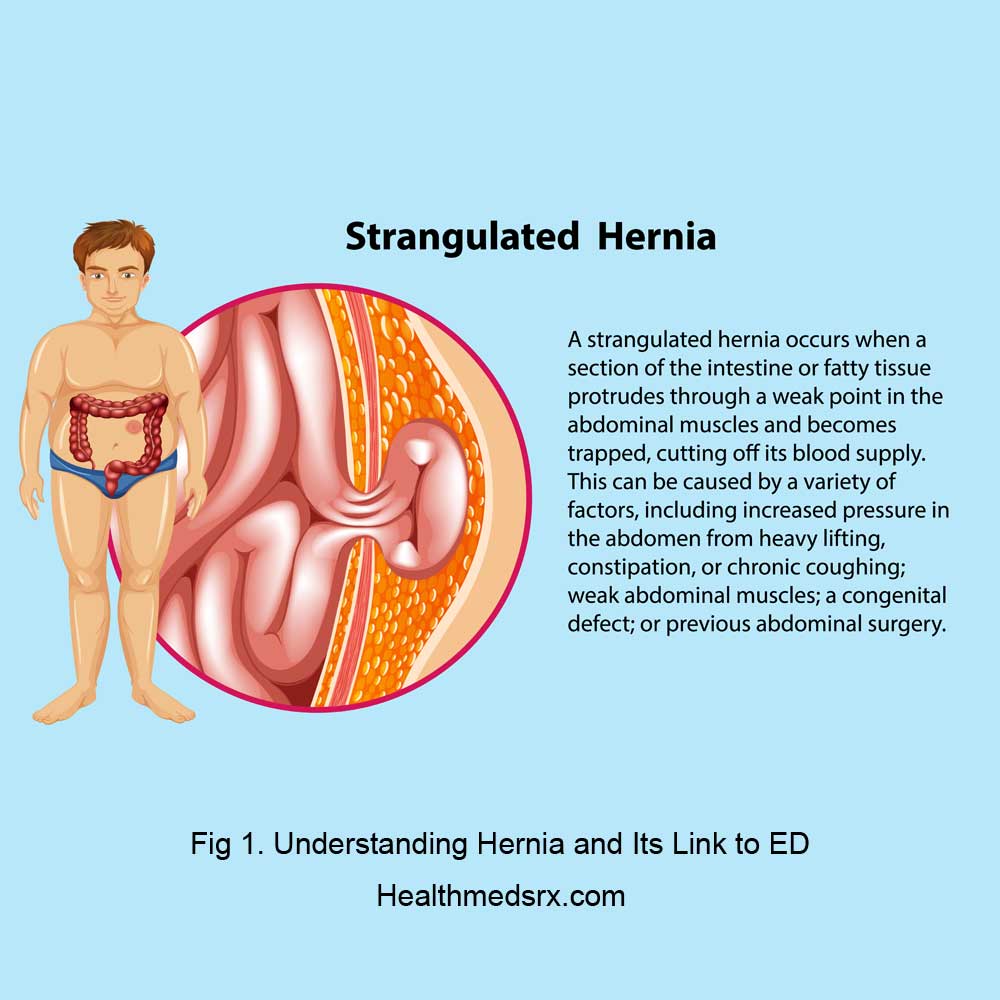A hernia is a condition in which an organ or tissue pushes through a weak spot in the muscle or connective tissue of the body and protrudes out of its normal position. Hernias are occur in the abdomen wall. They can develop at any time as a result of strain from heavy lifting, obesity, persistent coughing, or straining during bowel motions. Inguinal hernias, which are located in the groin region, umbilical hernias, and hiatal hernias are common varieties (involving part of the stomach pushing up into the chest). If you think you may have a hernia, it’s crucial to seek medical attention because these conditions can be painful and uncomfortable. The article demonstrates the relation between Hernia and Impotence.

Can a Hernia cause ED?
The connection between hernias and erectile dysfunction (ED) is still under research. However, there are some signs that the condition may do so. For instance, scarring and injury to the nerves in the pelvic region following hernia surgery have been related to an increased chance of getting ED. Moreover, men who have inguinal hernias may have decreased pelvic blood flow, which can potentially result in ED.
The prevalence of Erectile dysfunction (ED) in men with hernia has been rated around 25%. This number may vary because of some factors such as location and type of hernia and the severity of symptoms. For instance, Individuals who have had a complicated and large repair may be more likely to experience ED than those with less extensive repairs. Regardless of these differences in particular circumstances, it’s crucial for patients with any form of hernia to understand that they have a higher risk of having ED after treatment.
However, there are some treatments and solutions for men suffering from both conditions at the same time can manage their risks of erectile dysfunction caused by hernia diagnosis. These include making changes in regular lifestyle such as reducing stress levels and avoiding those activities that can further strain the abdominal wall, maintaining a healthy weight, do regular physical activity, avoiding smoking and alcohol, taking medications if needed and prescribed by a doctor, finding out counseling if required, and talking freely with your partner about your sexual health issues. Those who have both a hernia diagnosis and erectile dysfunction may find relief through appropriate medical care if they use management techniques like these.
How to overcome ED risk?
Finding solutions to reduce the risks begins with identifying the risk factors for erectile dysfunction (ED). Obesity, smoking, binge drinking, diabetes, and cardiovascular disease are all frequent risk factors. It’s crucial to understand that some medical disorders, such hernias, can make people more susceptible to developing ED. You can attempt to make changes that lessen or eliminate the elements that may be causing your disease by becoming aware of what they may be.
Another strategy to lower the risks associated with ED brought on by a hernia diagnosis is by making sensible lifestyle adjustments. You can improve your general health and possibly lessen the symptoms of ED associated with hernias by eating nutritious meals, exercising frequently, and maintaining a healthy weight. Also, refraining from engaging in any activities that can aggravate the abdominal wall or produce discomfort will assist prevent any further harm from happening and promote normal healing of the weakened area over time.
Lastly, there are pharmacological choices accessible for people who have both hernias and ED at the same time and want to treat their disease more effectively than with simple lifestyle changes. Drugs like phosphodiesterase type 5 inhibitors (PDE5-i) have been demonstrated to increase blood flow in men with erectile dysfunction that is primarily vascular in origin, such as those seen after surgery or injury, they may also be helpful in treating situations where there has been decreased blood flow specifically because of inguinal hernias. These medications should only be taken when prescribed by a doctor following a comprehensive discussion of a patient’s needs and any potential side effects. These drugs may offer some men the chance to have improved sexual performance despite having both diseases at the same time.
Will fixing Hernia treat ED?
The most effective treatment for hernia-related ED is often surgery to correct the hernia. But, before choosing if this course of action is best for you, you should take into account the hazards connected with surgical treatments. Surgical risks could include wound infection from the incision sites, hemorrhage, or nerve injury that could result in localized numbness or even permanent disability if not treated promptly. It’s also crucial to keep in mind that even after surgery recuperation, there can still be some lingering ED symptoms.
In terms of results after surgery, the majority of patients report improved function and decreased pain compared to baseline levels. Several studies have shown that men with hernia repair procedures frequently experience improved erectile function following ward in comparison to both before and after using drugs like PDE5-i inhibitors. These findings imply that even though particular factors affect each case’s outcome, treating hernias surgically can frequently help reduce ED symptoms.
In conclusion, while treating a hernia may not always guarantee full relief from symptoms of erectile dysfunction (ED) associated with the condition, it may offer at least partial relief, especially when used in conjunction with other forms of treatment like lifestyle changes and prescription medications if necessary. Before deciding on a course of treatment, it is advisable for patients considering this kind of therapy to have a full conversation with their doctor about their worries and options.
Treatments for ED
Oral medication is the most common and recommended for ED men. Some popular ED medications such as Zenegra, Caverta, Cenforce, Suhagra, Aurogra, etc. treat very well in ED and get satisfactory sexual activity. These medications have Sildenafil as active chemical component. Sildenafil improves blood circulation in the body. Hence, men get firm and harder erections when they are sexually stimulated.


